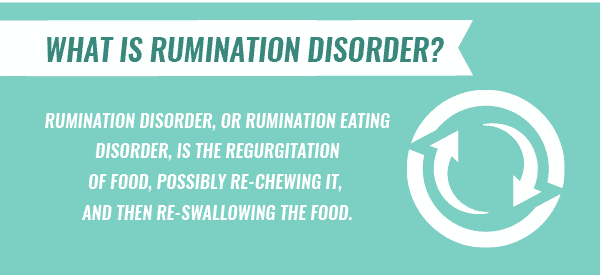Rumination disorder is a rare eating disorder characterized by the repeated regurgitation and re-chewing of food that has already been swallowed. Unlike vomiting, which is a reflexive action, regurgitation in individuals with rumination disorder is intentional and under their control. The regurgitated food is either re-swallowed or spit out. Rumination disorder can affect individuals of any age, but it is most commonly observed in infants and children.
The exact causes of rumination disorder are not well understood, but it is thought to be related to a combination of psychological and environmental factors. Some studies suggest that it may be related to stress or anxiety, while others suggest that it may be a learned behavior. It can also be associated with other mental health conditions, such as anxiety, depression, and obsessive-compulsive disorder.
Rumination disorder can have serious health consequences, as the repeated regurgitation and re-chewing of food can lead to malnutrition, dehydration, and dental problems. In severe cases, rumination disorder can lead to weight loss and other health complications.
Diagnosing rumination disorder involves a thorough evaluation by a healthcare professional, including a physical exam and medical history. Tests may be conducted to rule out other medical conditions that may be causing the symptoms.
Treatment for rumination disorder typically involves a combination of dietary and behavioral interventions. The primary goal of treatment is to break the habit of regurgitating and re-chewing food. Behavioral therapy, such as habit reversal training, can be effective in helping individuals with rumination disorder learn new behaviors and coping strategies. In some cases, medication may be prescribed to address underlying psychological conditions that may be contributing to the disorder.
Preventing rumination disorder involves promoting healthy eating habits and addressing underlying psychological conditions that may increase the risk of developing the disorder. Educating individuals and families about the risks and consequences of rumination disorder is also important in raising awareness and reducing the stigma associated with seeking treatment.
Therefore, Rumination disorder is a rare eating disorder characterized by the repeated regurgitation and re-chewing of food that has already been swallowed. While the exact causes of rumination disorder are not well understood, it is thought to be related to a combination of psychological and environmental factors. Treatment for the disorder typically involves a combination of dietary and behavioral interventions. If you or someone you know is struggling with rumination disorder, it is important to seek the help of a healthcare professional as soon as possible.

